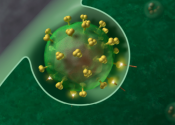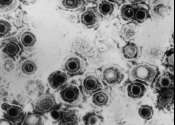Scientists zoom in on AIDS virus hideout
French scientists said Wednesday they had found a way to pinpoint elusive white blood cells which provide a hideout for the AIDS virus in people taking anti-HIV drugs.
Mar 15, 2017
0
86
French scientists said Wednesday they had found a way to pinpoint elusive white blood cells which provide a hideout for the AIDS virus in people taking anti-HIV drugs.
Mar 15, 2017
0
86

Scientists at the Gladstone Institutes and the University of California, San Francisco (UCSF), together with collaborators in Europe, discovered that a common type of cell within the human reproductive and intestinal tracts ...
Feb 16, 2017
0
10

Fighting off cancer requires the concerted efforts of immune molecules throughout the body, rather than just in the tumor itself, according to a new study of laboratory mice by researchers at the Stanford University School ...
Jan 19, 2017
0
2

Investigators from Whitehead Institute, the Ragon Institute of MGH, MIT and Harvard and the Broad Institute of MIT and Harvard have used CRISPR-Cas9 gene-editing technology to identify three promising new targets for treatment ...
Dec 19, 2016
0
70

(HealthDay)—Many HIV-infected patients have rapid and successful immune and virological response to antiretroviral therapy (ART), according to a study published online Sept. 27 in the Journal of Clinical Pharmacy and Therapeutics.
Sep 30, 2016
0
2

Tulane University researchers found some monkeys whose immune systems are depleted by the simian strain of HIV have a second line of defense against tuberculosis. The discovery could have significant impacts on future vaccines ...
Sep 6, 2016
0
68

Anti-HIV medications suppress the viral load of people living with HIV and provide durable protection against heterosexual transmission a study led by the University of North Carolina at Chapel Hill found. Researchers found ...
Jul 18, 2016
0
3

Biologically speaking, we carry the outside world within us. The food we ingest each day and the trillions of microbes that inhabit our guts pose a constant risk of infection—and all that separates us from these foreign ...
Jun 13, 2016
0
111

Yale scientists have solved a puzzle of the immune system—how antibodies enter the nervous system to control viral infections. Their finding may have implications for the prevention and treatment of a range of conditions, ...
May 18, 2016
0
141

Researchers from the University of Illinois at Urbana-Champaign have developed a highly sensitive biosensor based on a differential immuno-capture technology that can detect sub-populations of white blood cells. As part of ...
Mar 11, 2016
0
29
